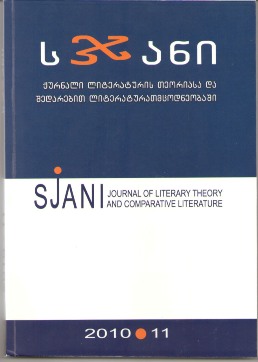ლიტერატურული დისკურსის მოდელები საბჭოთა ტოტალიტარიზმის პირობებში
The Models of Literary Discourse within Soviet Totalitarianism
Author(s): Irma RatianiSubject(s): Literary Texts
Published by: ლიტერატურის ინსტიტუტის გამომცემლობა
Keywords: Soviet Totalitarianism; literary discourse; Soviet discourse; Anti-soviet discourse.
Summary/Abstract: The aim of this paper is to discuss and analyze structural models of literary discourse being captured within the frameworks of Soviet totalitarian regime. Literature is a conceptual reflection on ongoing processes; Context, serving as a background for the formation of a literary text, is reflected on conceptual and expressive layers of the same text. If we take into consideration intrinsic longing of literature towards intellectual and representative freedom we can vividly envisage the obstacle emerging between a literary text and real context under the conditions of totalitarian regime. The creation of ideological diktat, as a violent governing system, is the ultimate sign of totalitarianism as well as formation and establishment of clichés, which limits the boundaries of literary freedom to a great extend. The 1920s can serve as an illustration, when modernistic tendencies established in Georgian literature became in conceptual antagonism with the ideological principles of Soviet diktat. The policy marked by destruction of spiritual values opposed literary process marked by inner, spiritual quest, which in itself reflected precisely the crisis of the epoch, the general scepticism and nihilism that reigned in the society oppressed by intellectual terror. The opposition between totalitarian regime and artistic-literary thinking existed for decades and formed important stages in the history of Georgian culture. Under such circumstances, from the standpoint of the analysis of literary studies, emphasis is made not only on the evaluation of conceptual and motivational models of a text – but the revealing of literary discourse reaction on intellectual terror, systematization of those structural models, which are offered by extended literary materials; in addition, the establishment of the link between conceptual-motivational and structural models of literary discourse is also important, realizing how tight or loose this link is. The process is symptomatic and entails a wide cultural area. Soviet union represented a symbol of artificial historical and cultural eclecticism, however incompatibility was successfully masked by the proper functioning of hyper-tropic state machine and the principle of the centralization of the authorities: an individual’s need is shared by everyone, what is rule for one, is for everyone, an individual’s lifestyle should be accepted by every single person – the decision was made unanimously by the centre; nationality, history, tradition, thinking and longing are details of marginal value against the background of red Soviet marker. Is the interior of this artificial system as naïve as a façade? Obviously not. Brave revolutionists had developed as cynics and fanatics, and the concept of a leader acquired an ambivalent and ambiguous meaning.
Journal: სჯანი
- Issue Year: 2010
- Issue No: 11
- Page Range: 49-57
- Page Count: 9
- Language: Georgian

